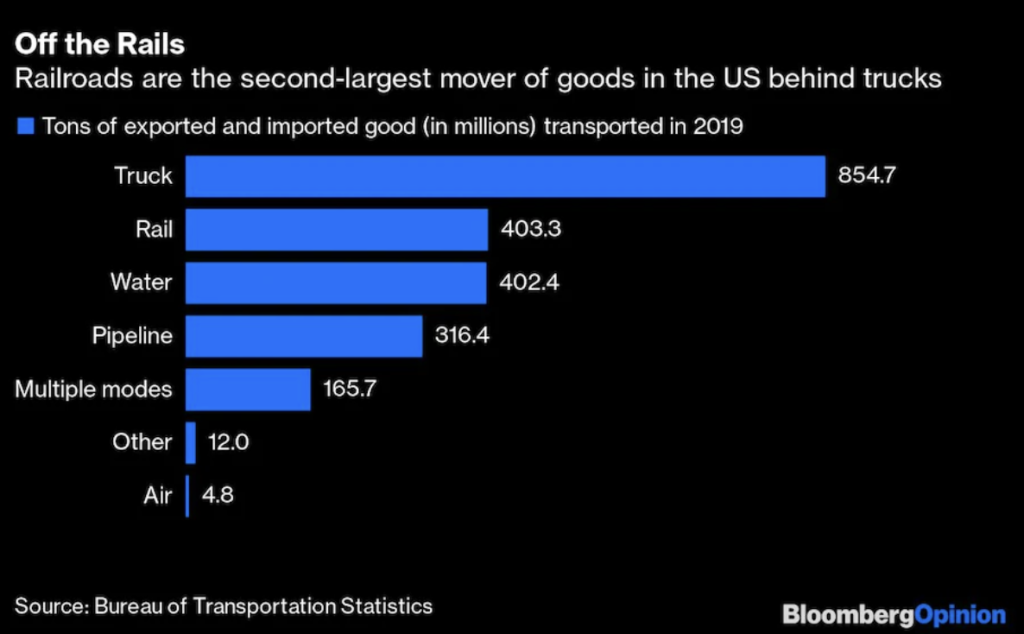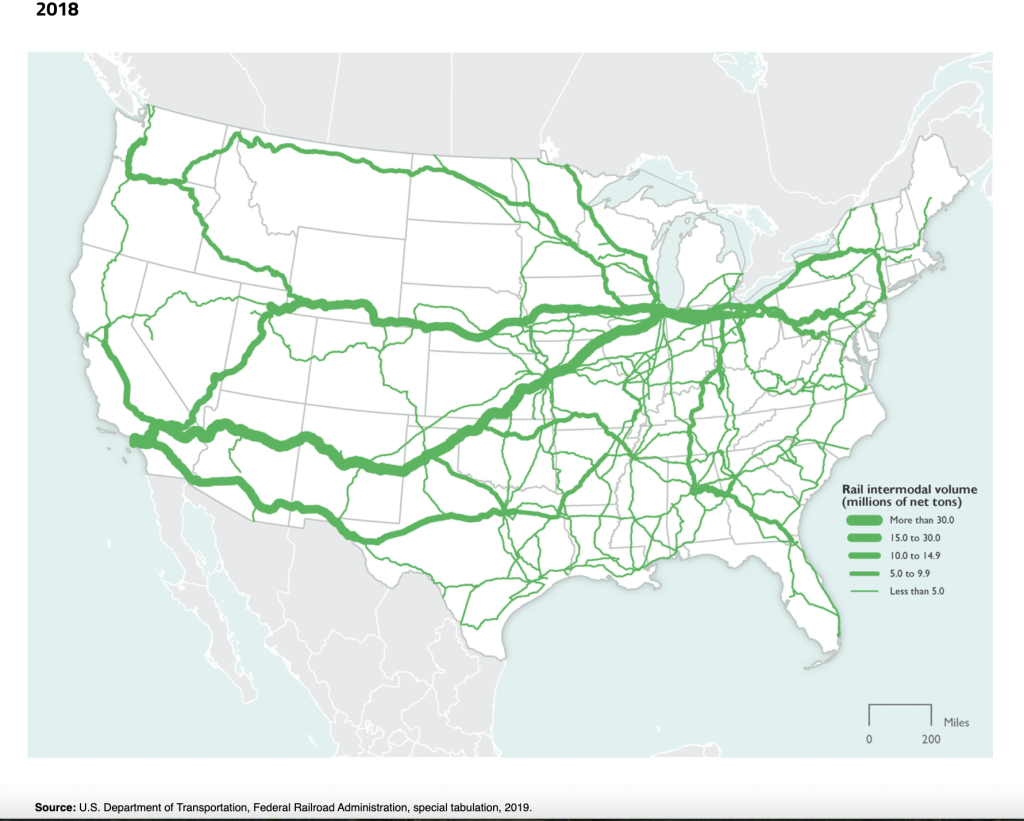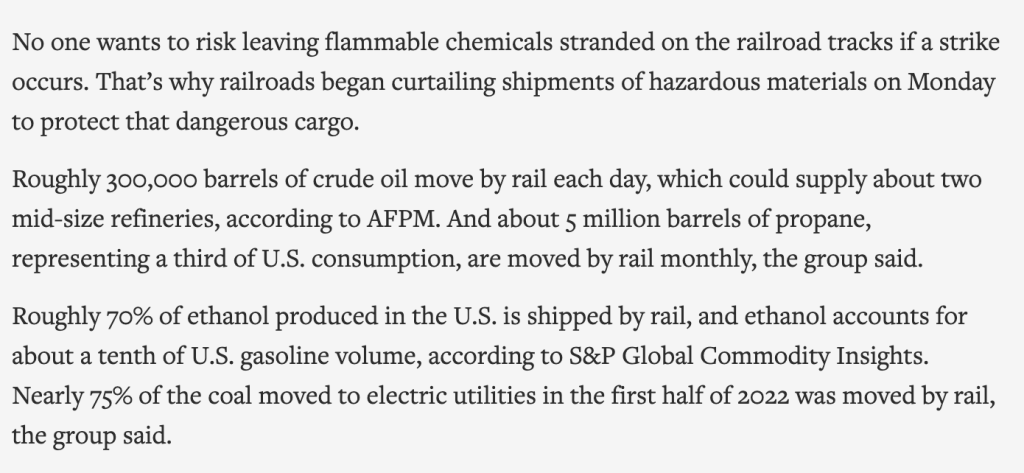President Biden announced a "tentative agreement" with rail workers that would save his administration from a disastrous leap in his march toward what appears to be planned economic collapse. He has allegedly taken a "personal interest" in the matter—not surprising given midterms are just around the corner. This may be a case of "don't count your chickens before they hatch" because there are still openings to back out.
According to the Wall Street Journal reporting, "the tentative agreement, under a standard ratification process, will now go back to the unions for a vote. Under the deal, the parties agree to a post-ratification cooling-off period expected to last several weeks." If such a deal falls apart, Congress could theoretically step in. However, "White House officials were reluctant to call on Congress to step in to extend the deadline for the negotiations or force a resolution to the dispute."
As stated by the U.S. Department of Labor, "a disruption [of rail transportation] would have a catastrophic impact on industries, travelers and families across the country." Industry is already suffering a strained supply chain from two-plus years of pandemic lockdowns and business closures. The strike would deal a devastating blow to small and large businesses alike. Commuters, food and energy producers, car manufacturers, retail and agriculture, and consumers are among those who would pay the price. Despite Biden's best efforts to gaslight Americans about how great things are, the economy is rapidly transitioning to life support. A strike like this would have a devastating impact on American households.
According to AP reporting, the strike goes back to 2019 when "the nation's biggest freight railroads began negotiating with a dozen different unions representing about 115,000 workers." The Biden administration is and has been applying pressure on the unions to settle before Friday—when the unions are actually allowed to strike "under the federal law that governs railroad contract talks." Railways are second only to trucks when it comes to moving goods. The Presidential Emergency Board (PEB), appointed by Biden in July, produced a report in mid-August with recommendations for ways to settle the dispute.
 Rails Graph/Washington Post
Rails Graph/Washington Post
 Railway Tonnage and Routes/https://data.bts.gov/stories/s/Freight-Transportation-System-Extent-Use/r3vy-npqd
Railway Tonnage and Routes/https://data.bts.gov/stories/s/Freight-Transportation-System-Extent-Use/r3vy-npqd
The three-year labor dispute is between Class I rail carriers and 12 U.S.-based rail labor unions. The PEB offered significant wage increases with "24% compounded wage increases by 2024, with 14.1% of those increases effective immediately, along with additional service recognition bonuses totaling $5,000 over the course of the contract." However, the unions have held out for more flexible hours for engineers and conductors. The Washington Post wrote:
"The railroads want flexible work hours to keep trains running. The unions that represent train crews are digging in against attendance policies that require them to report to work on 90 minutes notice. Engineers and conductors complain that they get stuck out on the road and that time staying in a hotel doesn't boost their pay. Since the pandemic hit in March 2020, the railroads have struggled to hire and retain workers."
According to other reporting by the AP, as of Wednesday:
"Members of one union rejected a tentative deal with the largest U.S. freight railroads while two ratified agreements and three others remained at the bargaining table just days ahead of a strike deadline, threatening to intensify snarls in the nation's supply chain that have contributed to rising prices.
About 4,900 members of the International Association of Machinists and Aerospace Workers District 19 voted to reject the tentative agreement negotiated by IAM leadership with the railroads, the union said Wednesday. But the IAM agreed to delay any strike by its members until Sept. 29 to allow more time for negotiations and to allow other unions to vote."
In a joint statement on Thursday, the Brotherhood of Locomotive Engineers and Trainmen (BLET) and the Transportation Division of the International Association of Sheet Metal, Air, Rail, and Transportation Workers (SMART-TD) announced terms that included for the first time in three years, the negotiation of "contract language exempting time off for certain medical events from carrier attendance policies." Additionally, they announced that "there will be no increases to insurance co-pays and deductibles." Significantly, the tentative agreement "includes agreement provisions that will create voluntary assigned days off for members working in thru freight service, and all members will receive one additional paid day off. Most importantly, for the first time ever, the agreement provides our members with the ability to take time away from work to attend to routine and preventive medical care, as well as exemptions from attendance policies for hospitalizations and surgical procedures."
The agreement also specifies the following for workers:
- The highest general wage increases over the life of the agreement in over 45 years.
- Blocks the carriers' attempts to fast-track arbitration on crew-consist agreements, protecting two-person crews for the indefinite future.
- Blocks carriers' demands for increases in point-of-service health care costs.
- Blocks carriers' demands to charge married employees with children more for monthly health care contributions.
- Retroactively applies general wage increases and performance bonuses, providing our members with meaningful back paychecks in the coming weeks.
The union agreement represents approximately 125,000 active and retired rail employees.
It is no wonder the Biden administration has been so fervent in its pursuit of an agreement. The U.S. Chamber of Commerce reported a national railroad strike could cost the U.S. economy "more than $2 Billion a day."
Worried about the impending strike, Amtrak jumped into the fray on Wednesday, announcing it would cancel all long-distance trains with the exception of most routes on the Northeast Corridor beginning on Thursday. Amtrak has not yet amended its plans to cancel the routes. Besides the effects on commuters, the strike would affect several industries profoundly. Parts for various manufacturers, like the automobile industry, are often transported by rail. New vehicles from across the border will be delayed. The cost of energy will rise, both at the pump and in American homes. Railroads will halt or curtail shipments of hazardous materials "to protect dangerous cargos."
 Costs of a Strike/https://apnews.com/article/rail-strike-impact-5eb6747b3e4b4e39d764644d6377121d
Costs of a Strike/https://apnews.com/article/rail-strike-impact-5eb6747b3e4b4e39d764644d6377121d
Agriculture depends heavily on rail transport for the delivery of feed to livestock. "Every week, the nation's chicken industry receives about 27 million bushels of corn and 11 million bushels of soybean meal to feed chickens, said Tom Super, senior vice president of the National Chicken Council." Retailers are making contingency plans and have been for months. Many are still moving their goods to trucks. However, there are not enough trucks or drivers to meet the demand. In all cases, a strike like this would cause a ripple effect throughout the economy.
Meanwhile, back in the swamp, Congress reached the usual bitter impasses while Americans reel daily from the numerous, purposeful ways this administration is destroying every aspect of American life—most of it unnecessarily. Zerohedge reports that "Sen. Bernie Sanders (I-VT) blocked a Republican effort to require railroad employees and companies to accept recommendations of a nonpartisan panel in order to avoid a strike." Sanders blocked it because he says energy companies are too profitable. The GOP resolution "introduced by Senate Health, Education, Labor and Pension Commission Ranking Member Richard Burr (R-NC) and Sen. Roger Wicker (R-MI), would have required railroad workers to adopt the outlines of a labor deal." Senate Minority Leader Mitch McConnell said if the strike were to happen, the Dems and Biden are to blame.
Regardless, Biden's next speech will spin this strike and its unintended consequences as nothing but good news for the American family. The agreement may well serve union workers. They may well deserve the quality of life upgrades, the wage hikes, and fixed premiums. However, concessions like these will likely force increased costs for carriers and consumers alike—in an economy that is already under enormous strain.


